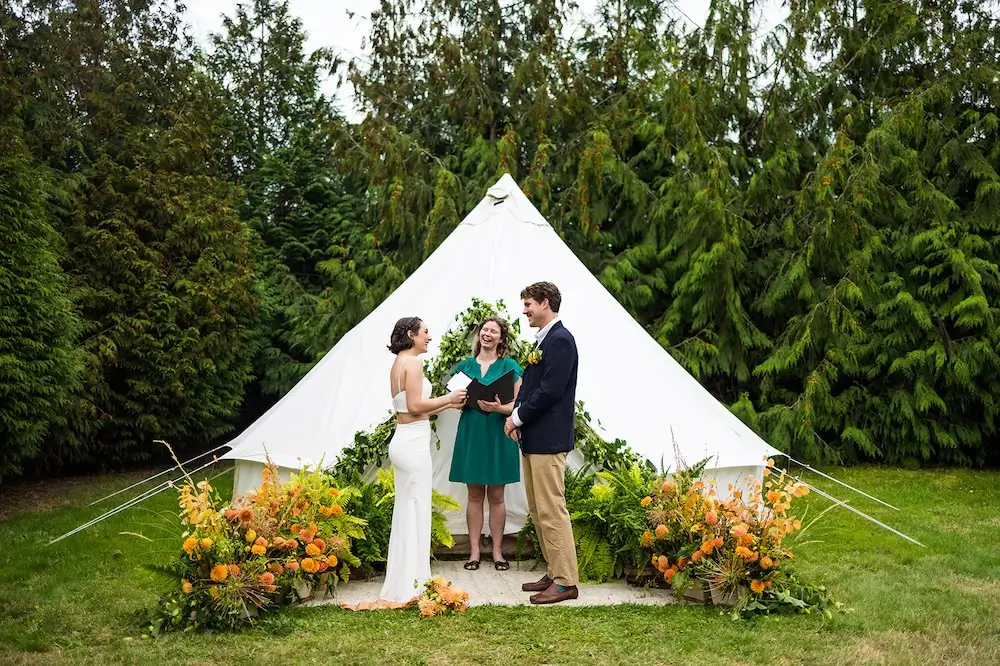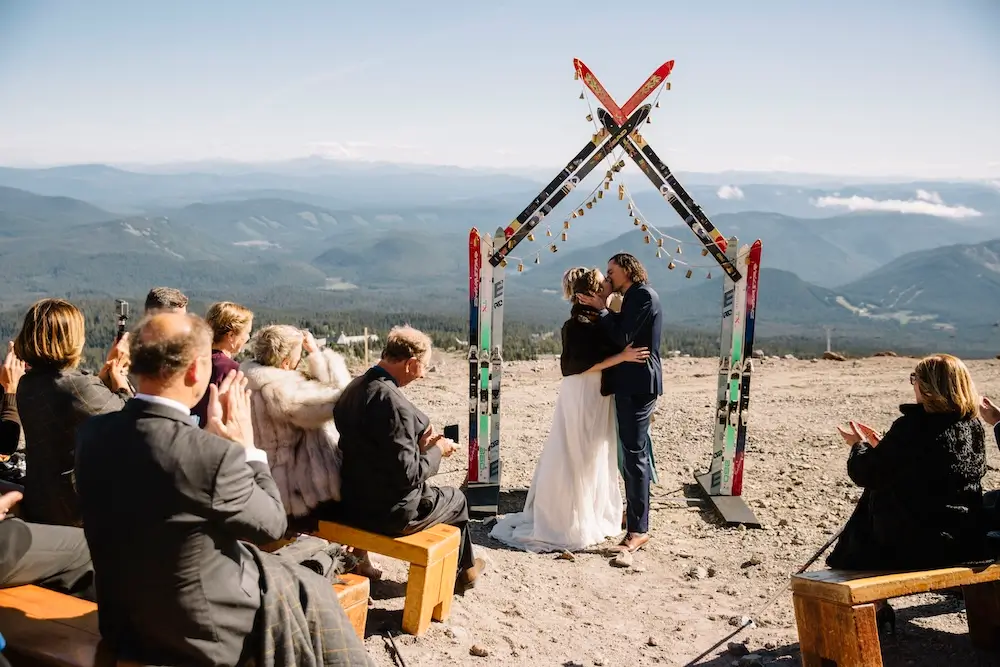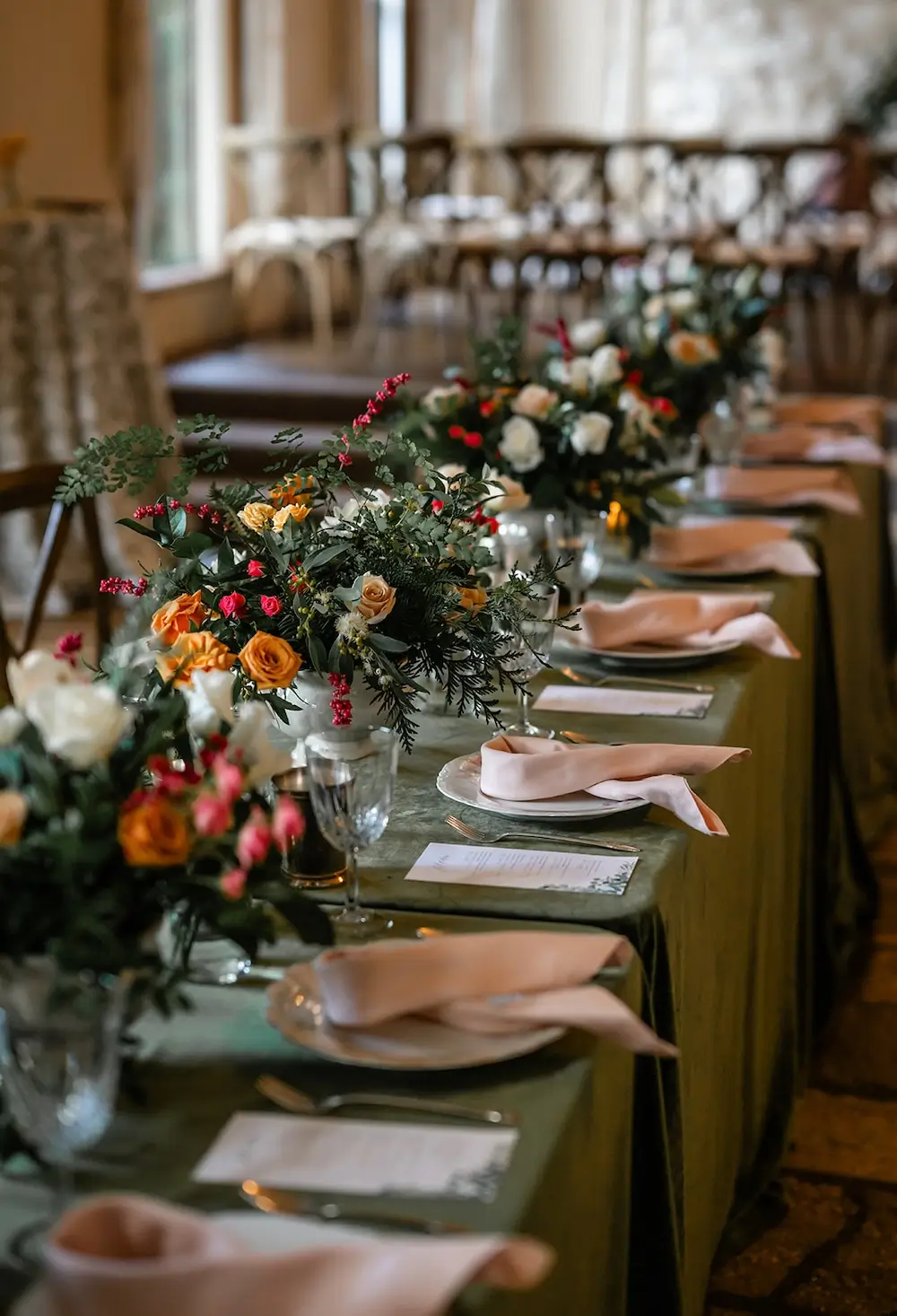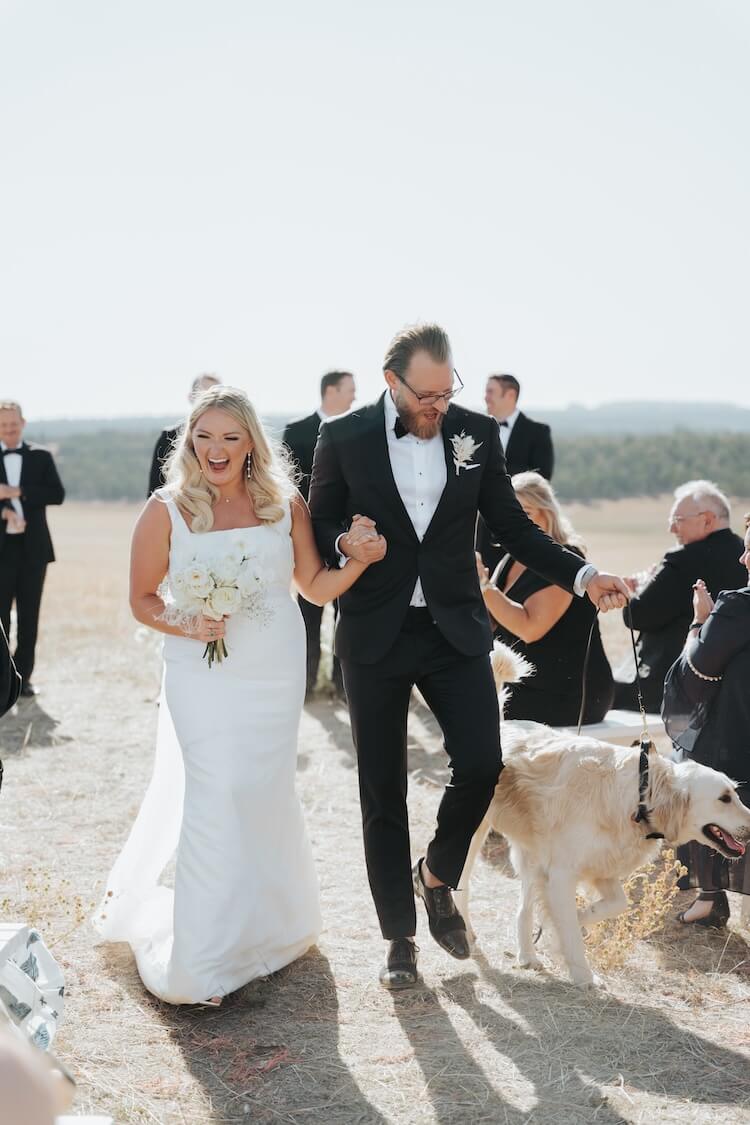We're going to cover everything you need to know so you can decide if a small wedding is right for you and provide you with everything you need to pull one off — all linked right here on this page! Don't be shy about bookmarking this one, you'll likely want to return to it again and again if you decide to go micro!
Whether you've heard of micro weddings, been to one, or just stumbled upon this page by searching a related term like small weddings, intimate weddings, or weddings with 50 guests or less, this page is going to bring you completely up to speed on all things micro wedding — think micro weddings 101 or micro weddings for dummies or a beginners guide to micro weddings.
Micro weddings have become increasingly popular in recent years, largely due to the pandemic when couples were forced to choose between cancelling their wedding or cutting their guest list back, but they actually have a long history dating back centuries. In the past, smaller, more intimate weddings were often the norm due to various factors such as limited resources, cultural traditions, or religious beliefs. One of the earliest examples of micro weddings can be found in ancient Rome, where marriages were typically small affairs held in private homes or temples with only close family and friends in attendance. These intimate ceremonies were seen as a way to strengthen familial bonds and ensure the couple's happiness and prosperity.
Today, micro weddings continue to gain popularity as couples seek more personalized and meaningful ways to celebrate their love. With smaller guest lists and more attention to detail, these intimate gatherings allow for greater flexibility in terms of location, decor, and overall experience. Whether inspired by tradition or necessity, micro weddings have certainly stood the test of time and continue to be a popular choice as more and more couples recognize the benefits of choosing to have a wedding with 50 guess or less (more on that below).
We wrote an entire guide covering the question, what is a micro wedding?, but here are the highlights. A micro wedding is nothing more than a tiny version of a "traditional wedding", generally having between 1-50 guests. Despite being small, this type of wedding can have all the elements of an average sized wedding or you can choose to make it really simple. Micro weddings place the focus back on celebrating what's really important — your love story!
There are so many different types of weddings. As you get into planning for your big day, you'll start to come across all sorts of weddings and you might be left wondering what the differences are. Little disclaimer here, the definition of these will change depending on who you're talking to so its good to be aware of that as you start to explore different packages and look for wedding pros.
We define an elopement as a wedding celebration without any guests. Elopements can be as simple as exchanging vows in your own backyard or as extravagant as jetting off to a dream adventure destination. Elopement offer a lot of flexibility and are a great option for couples seeking a private experience.

These types of weddings are generally shorter in length and usually offer all-inclusive packages. They're great for the couple that just wants to pick a date, some attire, and show up.
When you think of a wedding, this is likely what comes to mind. Traditional weddings have larger guest lists and usually include all the customary elements such as wedding parties, full ceremonies and receptions, traditional venues, first dances, all the decor, etc.
When it comes to what's good about choosing a smaller guest list, I could say a million things. What I like most, and what I hear most often from couples who have chosen this route is that it just feels a lot more intentional and meaningful. Not to take anything away from larger weddings, but choosing only your closest people to witness you exchange your vows just hits different. Here are some of the top benefits of choosing a micro wedding.
This is actually the number one reason why couples choose to go small. A lot of people think it's for budget reasons but that's not the case. Simplifying things down to just your most important people and including only the parts of a wedding that you care about significantly changes the planning experience.
Talk to anyone who has had a larger wedding and they will always say that they didn't have time to talk to everyone at their wedding which is such a bummer since they came to celebrate with you. Micro weddings allow you the opportunity to hang with everyone that is excited to celebrate with you.
Micro weddings can be cheaper, but they don't have to be. When you have a large guest list, it's easy for your money to disappear quickly as soon as you book a venue and get food and beverage vendors hired. Having less guests allows more flexibility to allocate funds to the things you care about most or just to spend less in general.
The sky's the limit with a smaller crew. Find a public park, host your wedding at a restaurant, rent an Airbnb, or go for a traditional venue.

Less people just automatically means you get more time with everyone. Even at my micro wedding with 38 guests it was hard to spend a ton of time with each person during the reception, but you'll definitely have a better chance. I can't imagine what it would be like with hundreds.
When you distill your day down to only the most important people and things you can ensure the reason for the day is front and center — you and your partner.
This can feel like the hardest parts of having a micro wedding, but we've got you covered with our top tips for how to narrow down your wedding guest list. A few ideas to get you started is to have a wedding without kids, or one where the only people who are invited are those that know both of you well, or you could not invite any extended family. No matter how many people you invite to your wedding someone is bound to feel left out, but the important thing to remember is that this day is not about them...it's about you.
This is getting easier as more wedding professionals and venues are choosing to prioritize small weddings, but sometimes it can feel like finding a needle in a haystack. Use our wedding directory full of micro wedding photographers, small wedding venues, planners, florists, and more or use a search engine or social media using very specific search terms to uncover good options.
According to Zola, the average cost of a traditional sized wedding in 2024 is $33,000. For smaller weddings, the average is around $15,000, but remember that’s an average. We spent about $18,000 on our wedding with 40 guests, but we easily could have spent less or much more.
There is definitely a misconception when it comes to how much a micro wedding costs. A lot of people think smaller weddings are only for the budget-minded, but that's simply not true. While this style of wedding can cost less, I really like to think about it as having the opportunity to make your money go further. For example, if you only want to spend $2,500 on food, imagine the difference in options between a wedding with 150 people vs a wedding with 20, 30, or 50 guests!
The cost of any wedding is largely driven by how many guests you have. Food and beverage costs, event rentals, venue space, transportation, and even how much decor you'll need. Generally speaking, the things that affect the cost of a small wedding are headcount, space, complexity of the event, and time of year, day of the week, and finally, location.
Budgeting for your micro wedding looks no different than a traditional wedding. The first step is understanding how much money you want to spend and then allocating it to all the things you want to include in your day. It sounds simple enough, but there are a lot of things to consider. You can check out our micro wedding budget guide for a full list of steps to get your money in order before you start planning.
Whether you're choosing to have a simple celebration or something totally extravagent, the basic steps to planning a wedding are the same. Be sure to check out our comprehensive micro wedding planning guide and our complete small wedding checklist to guide you through each stage ensuring no detail gets overlooked.
I always recommend this as a first step. Unless you have an unlimited budget, mapping out how your money will be allocated is an important first step.
If you want all the details to tie together, defining your wedding theme early is a good idea. This can help you narrow down appropriate venues, figure out which wedding pros could be a good fit, and help you decide on attire.
Finding a wedding venue that's perfect for your intimate celebration can sometimes be a bit challenging which is why we've dedicated an entire section of the website to small wedding venues. Having a wedding with 50 guests or less opens up tons of opportunity for your venue.
Find a team of wedding professionals that is passionate about micro weddings (bonus if they have lots of experience with them).
Micro wedding timelines are really no different than regular weddings. They can be short or long, in the evening or during brunch, it's totally up to you.

Use our lists of small wedding ideas to craft the perfect celebration! Feel free to include everything that is meaningful to you and throw out the rest. It's easy to get caught up in FOMO and feel like you need to include every single element just because you found it on a wedding planning checklist, but don't fall into that trap. This is your day — create it based on what you love.

According to Zola, the average cost of a traditional sized wedding in 2024 is $33,000. For smaller weddings, the average is around $15,000, but remember that’s an average. We spent about $18,000 on our wedding with 40 guests, but we easily could have spent less or much more.
The cost of any wedding is largely driven by how many guests you have. Food and beverage costs, event rentals, venue space, transportation, and even how much decor you'll need
Generally speaking, the things that affect the cost of a small wedding are:
Micro weddings have unique challenges and opportunities, so having a wedding planner who has experience with more intimate events will work to your advantage. From knowing how to pick the right venue to recommending other great vendor partners and making recommendations to elevate your wedding experience in this niche will go a long way.
Before you hire any small wedding professionals, you'll want to have an idea of what style of wedding you want to have. Choosing a wedding pro whose style matches your ideal wedding vibe will help ensure it comes together per your vision. Additionally, you can be confident they'll make great recommendations for things you haven't thought of that could be a great addition to your day.
I always recommend choosing a wedding team from the area where you're getting married (or at least someone who has extensive experience in your wedding location). Local wedding pros have extensive expertise in location scouting and vendor recommendations, which will help ensure you can make the most of your chosen wedding location.